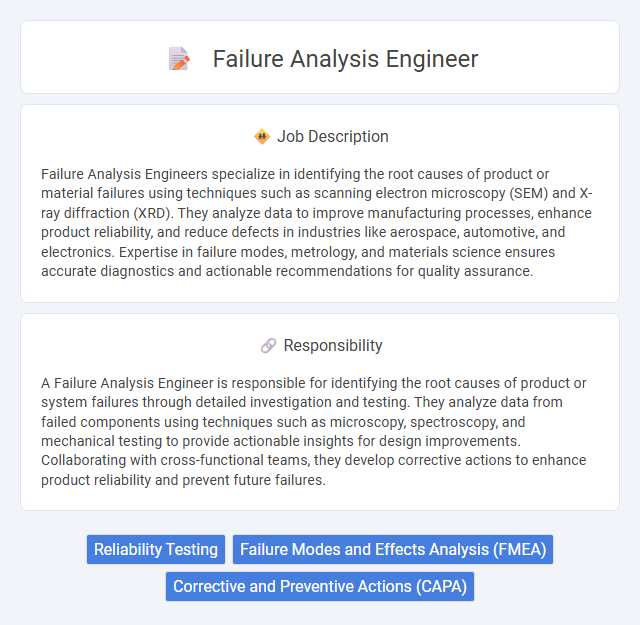
Failure Analysis Engineers specialize in identifying the root causes of product or material failures using techniques such as scanning electron microscopy (SEM) and X-ray diffraction (XRD). They analyze data to improve manufacturing processes, enhance product reliability, and reduce defects in industries like aerospace, automotive, and electronics. Expertise in failure modes, metrology, and materials science ensures accurate diagnostics and actionable recommendations for quality assurance.
Individuals with strong analytical skills, attention to detail, and a passion for problem-solving are likely to excel as Failure Analysis Engineers. Candidates comfortable working with complex technical data and collaborating across engineering teams probably have a natural fit for this role. Those who prefer predictable routines or limited hands-on investigation may find the dynamic and investigative nature of failure analysis less suitable.
Qualification
A Failure Analysis Engineer typically requires a bachelor's degree in engineering, materials science, or a related field, with strong expertise in root cause analysis and failure mechanisms. Proficiency in advanced diagnostic tools such as SEM, FMEA, and reliability testing methods is essential for accurate defect identification and prevention. Strong analytical skills combined with experience in data interpretation and report generation ensure effective communication of findings to improve product quality and reliability.
Responsibility
A Failure Analysis Engineer is responsible for identifying the root causes of product or system failures through detailed investigation and testing. They analyze data from failed components using techniques such as microscopy, spectroscopy, and mechanical testing to provide actionable insights for design improvements. Collaborating with cross-functional teams, they develop corrective actions to enhance product reliability and prevent future failures.
Benefit
A Failure Analysis Engineer position likely offers significant benefits, including the opportunity to apply technical expertise in identifying root causes of product malfunctions, which can enhance problem-solving skills and career growth. This role probably provides exposure to advanced analytical tools and methodologies, increasing professional value and marketability. Compensation packages for such roles are often competitive, potentially including bonuses and benefits related to innovation-driven industries.
Challenge
Failure Analysis Engineers likely encounter complex challenges that require deep diagnostic skills to identify root causes of product failures. They probably face difficulties in interpreting data from diverse testing methods while balancing time constraints and technical accuracy. Problem-solving under pressure and collaborating with multidisciplinary teams to recommend corrective actions is often a demanding aspect of the role.
Career Advancement
Failure Analysis Engineers leverage advanced diagnostic tools to identify product defects and improve manufacturing processes, driving quality control in industries like aerospace, automotive, and electronics. Mastery in materials science and failure mechanisms enhances expertise, opening pathways to senior engineering roles, project management, or specialized consultancy positions. Continuous professional development and certifications in Six Sigma or FMEA significantly boost career growth and leadership opportunities within tech-driven companies.
Key Terms
Reliability Testing
Failure Analysis Engineers specializing in Reliability Testing systematically evaluate products to identify failure modes and enhance durability under various stress conditions. They employ techniques such as thermal cycling, vibration testing, and accelerated life testing to simulate real-world usage and predict product lifespan. Their insights optimize design improvements and ensure compliance with industry standards, reducing warranty costs and improving customer satisfaction.
Failure Modes and Effects Analysis (FMEA)
Failure Analysis Engineers specialize in identifying and evaluating potential failure modes using Failure Modes and Effects Analysis (FMEA) to improve product reliability and safety. They systematically assess each failure mode's causes and effects to prioritize risks and recommend corrective actions in design, manufacturing, and quality processes. Expertise in FMEA enables these engineers to reduce product defects, enhance durability, and optimize maintenance strategies.
Corrective and Preventive Actions (CAPA)
Failure Analysis Engineers specialize in identifying root causes of product failures and developing Corrective and Preventive Actions (CAPA) to enhance reliability and quality. They utilize advanced diagnostic tools and data analytics to implement CAPA strategies that reduce defect rates and prevent recurrence. Effective CAPA management ensures compliance with industry standards and drives continuous improvement in manufacturing processes.
 kuljobs.com
kuljobs.com